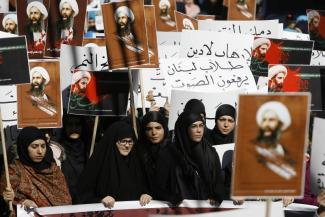Middle East
Scrambling against decline
 Lebanese Shias are angry about the execution of Nimr al-Nimr.
Zataari/AP Photo/picture-alliance
Lebanese Shias are angry about the execution of Nimr al-Nimr.
Zataari/AP Photo/picture-alliance
Sheikh Nimr Baqir al-Nimr, whom Saudi Arabia executed on 2 January 2016, was a prominent and high-ranking Shia cleric in Saudi Arabia’s Eastern Province. The population of this oil-rich province is reportedly predominantly Shia. Nimr was born in one of its villages in 1959.
He left to study religion in Iran in 1979. That was when the Islamic Revolution toppled Iran’s Shah Mohammad Reza Pahlavi and brought to power a Shia revolutionary regime. Nimr returned to Saudi Arabia in 1994 to become the most influential faith leader of the country’s Shias.
He was critical of the Saudi royalty and particularly of how it treats the Shia minority. He insisted on non-violence, but supported Iran’s post-revolutionary principle of governance called the “Guardianship of the Jurisprudent”, which puts the supreme leader in charge of ultimate decision-making. However, Nimr was quite critical of Syria’s President Bashar al-Assad and his suppressive policies against opponents. Iran supports Assad.
Nimr’s execution has domestic and international implications. They concern the sectarian Sunni-Shia strife invoked by the Saudi regime to consolidate its authority at home and project power abroad. It also needs to be seen in the context of the geopolitical rivalry between the kingdom and its arch-enemy Iran, which is evident in civil wars in Syria and Yemen as well as other conflicts in the wider Middle East.
In the eyes of the Saudi leadership, Iran’s recent rapprochement with the west is worrisome. Last year’s agreement on banning nuclear arms and lifting sanctions has boosted Tehran’s standing.
The execution of Nimr has sent a clear message to Saudi Arabia’s Shia minority that dissent is not tolerated. At the same time, it was meant to provoke Iran. The Saudis hoped that Iran might respond in a way that would help them to rally Arab allies and slow down, if not reverse, the ongoing shift in the regional balance of power.
Indeed, hardline protesters soon and set it ablaze. Iran’s President Hassan Rouhani condemned such action, but the event provided what the Saudis had wanted: an opportunity to play the victim and mobilise Arab fears.
Riyadh severed diplomatic ties with Tehran and successfully encouraged Bahrain, Sudan and Djibouti to follow suit. Moreover, Saudi Arabia pledged Somalia aid worth $ 50 million if it cut diplomatic relations with Iran – which Somalia did.
Trita Parsi, the head of the US-based National Iranian American Council, sees a new recklessness in the foreign policy of King Salman and his son Muhammad, the defence minister. In this perspective, the Saudi approach looks like the frenzied reactive-aggressive scramble of a sectarian state that is facing regional decline.
The acrimony between Iran and Saudi Arabia is old. It goes back to the pre-revolutionary era when Iran’s Shah was the west’s gendarme of the Middle East, which is predominantly Arab. Iran held the upper hand over its Arab neighbours in military and economic terms.
The rivalry became obvious to everyone and intensified after Iran’s revolution. Issues of religious ideology suddenly mattered, and sectarian differences added to the problems. Arab countries considered Iran an emergent Shia powerhouse that was keen to export its revolution, subvert the Sunni old guard and revise the regional order.
To contain revolutionary Iran, Saddam Hussein, Iraq’s authoritarian leader, started war in 1980. Back then, he was supported by the west as well as Saudi Arabia. The attritional war went on until 1988 and caused terrible suffering. Iranians have not forgotten, moreover, that a clash between Shia demonstrators and Saudi security forces claimed the lives of over 400 people during the Hajj pilgrimage in 1987. Most of the dead were Iranian.
Western leaders know that Iran and Saudi Arabia must be on board if international talks to deliver peace to strife-torn Syria and military campaigns against the ISIS militia are to succeed. Whether Saudi Arabia shares their priorities is an open question. In the meantime, Iran’s people are delighted that economic sanctions have been lifted.
Maysam Behravesh is a research fellow at the Center for Middle Eastern Studies (CMES) at Lund University in Sweden.
maysam.behravesh@gmail.com.
